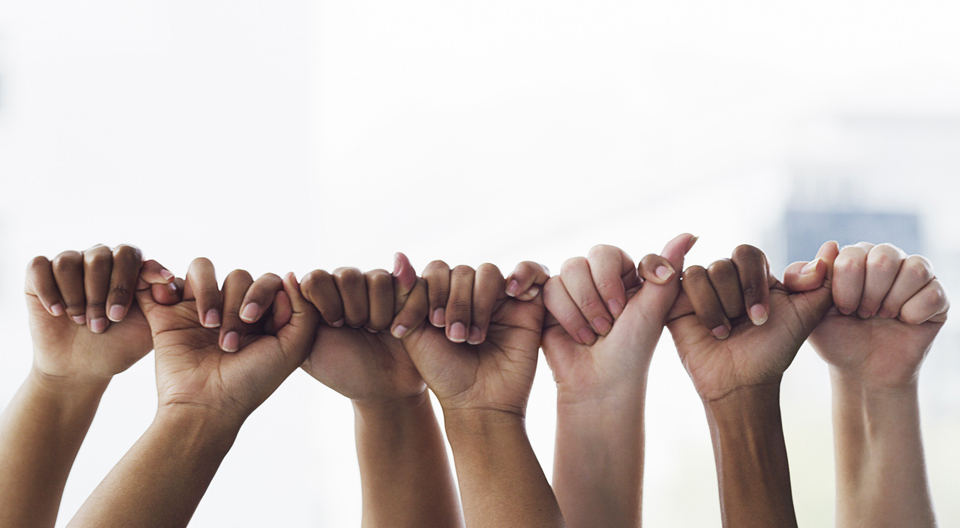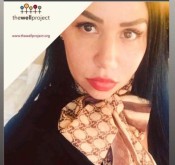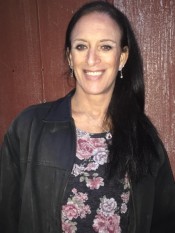
Lea esta hoja informativa en español
Table of Contents
- Normal Feelings
- Get Help and Support
- It Is Better to Know
- HIV and Women
- Make a New Start
- Useful Articles for People Newly Diagnosed With HIV
- Groups and Networks of Women Living with HIV

"HIV is not the end. As a 37-year long-term survivor, I am an example of that. Never let HIV take your life from you; continue to fight till the end."
MariaHIVMejia
Diagnosed in 1988
Lives in Florida
Getting an HIV diagnosis can be life-changing news. As with other chronic health conditions, people may have many different feelings when they learn they are living with HIV. You may be angry or confused or have other uncomfortable emotions. You may also wonder what you should do next and how this diagnosis will affect your plans for your future.
It may not change how you feel right now, but it is important to mention that people living with HIV can live just as long as anyone else in places where HIV drugs are widely available. Many years of research have shown that, if they are taking HIV drugs that keep the amount of virus in their body very low (or undetectable), a person living with HIV cannot pass on the virus to a sexual partner who is not living with HIV. It is also possible to get pregnant and give birth to a child who does not live with HIV. Breastfeeding your infant may be an option as well.

"Girl this is just a new beginning towards everything you deserve, it's not a punishment."
MasoniaTraylor
Diagnosed in 2010
Lives in Georgia
Normal Feelings
One possible first step is to accept that your feelings are a normal response to your diagnosis. Ignoring feelings such as fear or shock does not make them go away and may even make them last longer. Feelings are like waves that rise and fall. Try to allow yourself to feel what you are feeling and let the feelings pass through you. It is okay to cry if you feel like it.
There are people who still believe testing positive for HIV is a death sentence. This is definitely not true. HIV is a chronic health condition that can be managed with medications and care. Many people living with HIV lead full and healthy lives, as many people with other chronic health conditions do.
You may find yourself asking, "How could I have let this happen to me?" about acquiring HIV. Try to be gentle with yourself. You have just gotten some challenging, possibly unexpected news, and may face changes ahead. If being compassionate with yourself seems difficult, try to imagine how you would respond to a loved one if you just learned that they were living with HIV. Think about the love and comfort you might give that person and share some of this with yourself. You are just as deserving, and just as capable, of giving and receiving love as ever.

"I understand you must be frightened, but don't be. HIV is not what you think, it's a chronic but manageable illness that millions of us live with in dignity and strength. This is just the beginning of a long, beautiful life where good health, happiness and dignified productiveness are all completely up to you, so get used to living ... and on your terms."
KatieAdsila
Diagnosed in 2000
Lives in Alabama
Get Help and Support
Being diagnosed with HIV presents some challenges. Building a support network can help you learn how to cope. Take your time and do not feel that you must tell everyone right away. Do not let the fear of being judged keep you from talking to people. If it is hard to tell family and friends at first, you may want to turn to HIV organizations.
Some newly diagnosed people may want to speak with other people living with HIV. This can help them get out of isolation and overcome stigma. Other people may be more private and may prefer not to discuss their personal lives or health information with anyone else. That reaction is perfectly normal, as well.
There are many AIDS service organizations (ASOs) that offer support and information to people living with HIV. ASOs are great places to find helpful, non-judgmental people to talk with, and many offer support groups. Joining a support group and talking about your feelings in a safe space may help you handle your concerns. Some people feel uncomfortable in groups and may prefer to speak to someone one-on-one. An ASO may be able to connect you with someone to talk to. Follow this link to find an ASO in the US.
Finding networks or others who are living with HIV might also help you not feel alone. Be sure to check out The Well Project's blog, A Girl Like Me, for first-hand accounts of women across the gender spectrum living with HIV in different parts of the world and how each of them has dealt with her HIV diagnosis. We also have our A Girl Like Me LIVE video chat series – you can watch or listen to conversations on all kinds of topics among women living with HIV.

"Know one thing: Nothing, not one single thing, did you do to deserve this diagnosis. Even though it may feel this way now, know you are no lesser than because of it. It is going to get better, I promise."
HEROconnor
Diagnosed in 2016
Lives in Virginia
Read Heather's blog entry "To the Newly Diagnosed"
It Is Better to Know
Once you know that you are living with HIV, you can take charge of your health and take steps to remain healthy. Getting informed about HIV and its treatment will help you make the best medical decisions for you. The latest national and international guidelines recommend that all people diagnosed with HIV start treatment right away.
Try not to rush into decisions when you are still coming to terms with your diagnosis. Remember, you are in charge of your own healthcare. Take your time and learn about your options. Unless you are very ill and need to make treatment decisions quickly, you have time to think things through. For more information, see our fact sheet on Considerations Before Starting HIV Treatment.
If you do not have health insurance, an ASO may be able to guide you in getting coverage for your HIV care and other health needs. In the US, the Ryan White HIV/AIDS Program exists to ensure that people living with HIV who have no health insurance (or not enough health insurance to cover their needs) can get high-quality HIV care and HIV drugs, as well as other support services. The program funds local services. Most of these service providers help regardless of immigration status. See our fact sheet on Immigration to the US, Women, and HIV for more information.
Finding the right healthcare provider is important for getting good care. If possible, look for someone who specializes in treating HIV and has experience with many patients living with HIV.
Even though there is no cure for HIV, there are many HIV drugs that help keep the virus under control. Newer HIV drugs are much more effective, are easier on your body, and have fewer side effects than the older drugs. These drugs can help people to live long and healthy lives with HIV – and make it impossible to transmit HIV to partners through sex. See our fact sheet on Undetectable Equals Untransmittable for more information on this exciting finding.
If you are in the US, there are many ways to get HIV drugs, which vary depending on your income and in some cases on your immigration status. If you need help getting HIV care and drugs, check the HRSA Data Warehouse to find a medical provider funded through the Ryan White program, which does not ask about immigration status.
It is important that you get information and work with your healthcare provider to decide which treatments are best for you. While there are many good places to get information, some may provide false or misleading information. Check the information you are getting with your healthcare provider or compare it to other reliable sources to make sure it is accurate. Remember, there are no "miracle" cures. If it sounds too good to be true, it is probably not true.

"'Shame is the lie someone told you about yourself.' - Anais Nin. Choose not to believe the lie."
Red40something
Diagnosed in 2012
Lives in California
HIV and Women
You are not alone. Globally, women make up more than half of all people living with HIV. In the US, approximately one in four people living with HIV identifies as a woman, and in 2019, two percent of new HIV diagnoses were among people of transgender experience. There are many women living with HIV who can provide information, support, and advice.
For some people, keeping to yourself can make the process of moving forward after the diagnosis more difficult. Others may find it easier to think things through in private. If anyone threatens you with violence or is abusive when you reach out to them, this is not behavior that you have to accept. You can step away. It may be important to take yourself and any children you have somewhere else, where you can be safe and talk with someone you trust. You need and deserve a positive environment and supportive people in your life. For more information, see our fact sheet on Violence Against Women and HIV.
Important: If you are feeling threatened right now, call 911 or the National Domestic Violence hotline in the US at 800-799-SAFE [1-800-799-7233; or 1-800-787-3224 (TTY)], or text START to 88788. You can also search for a safe space online at Domestic Shelters.
Also, be careful not to put your family's welfare ahead of your own. When you take care of yourself, you are doing something good for yourself and your family. Making sure you are as healthy as you can be is part of supporting them. For more information, see our fact sheet on Women and HIV.

"There are always NEW beginnings, and there is always HOPE. A will to live and love again is what makes life beautiful."
JoDha
Diagnosed in 2005
Lives in India
Make a New Start
Being diagnosed with HIV is life changing; however, it does not change the essence of who you are. HIV is a virus. Learn to see yourself as a person living with HIV, not a victim. You can do this by getting informed, taking charge of your healthcare, and learning how to manage HIV. There are many resources to help you on this new path (see the Useful Articles for People Newly Diagnosed With HIV below).
You may find that some of the priorities in your life now change. This can be a good thing. Facing a serious illness can prompt people to make their lives better. Many people living with HIV make positive changes, such as breaking bad habits like drinking too much or smoking. As serious as this chronic condition can be, your life can still be full and healthy. You can find support and community, including among other women living with HIV. You are not alone. Do not give up on yourself or your dreams.

"Understand and stand tall knowing you're never alone, and you're always loved."
Destiny Smith
Diagnosed in 2017
Lives in Iowa
Useful Articles for People Newly Diagnosed With HIV
Quick links to related fact sheets or resources by The Well Project for those seeking information on HIV or HIV Treatment:
- What Are HIV & AIDS?: Basic information on HIV, including how HIV differs from AIDS.
- Women and HIV: You are not alone! Understand how HIV specifically affects women.
- Disclosure and HIV: Things to think about when telling others your HIV status.
- Considerations Before Starting HIV Treatment: Learn the benefits of starting HIV treatment sooner, and steps to prepare for treatment.
- Undetectable Equals Untransmittable: Building Hope and Ending HIV Stigma: There is zero risk of passing on HIV through sex if you are living with HIV and take HIV drugs that are working well.
- Pregnancy, Birth, and HIV: Women living with HIV can have babies with virtually no risk of their child acquiring HIV.
- Serodifferent Partners: Dating, Relationships, and Mixed HIV Status: People living with HIV can have loving relationships and great sex with partners who are not living with HIV.
- Safer Sex: Sex can be more relaxed, satisfying, and pleasurable when you can decrease your worry about health conditions that can be transmitted through sex.
- Oral Sex and HIV: Facts, Pleasure, and Health: Oral sex can be fun and pleasurable and is not likely to transmit HIV under most circumstances.
- HIV Transmission: Get the basics on how HIV is and is not spread.
Groups and Networks of Women Living with HIV
Below is a list of some of The Well Project's partner organizations serving women throughout the US (and beyond). For more organizations and groups, please also see our list of Collected Resources by and for Black Women Living with HIV.
- Arianna's Place / Arianna's Center: Sister organizations committed to engaging, empowering, and uplifting communities across their regions.
- Christie's Place: A nonprofit social service organization in San Diego County working to empower women, children, families and individuals whose lives have been impacted by HIVS to take charge of their health and wellness.
- Dandelions Movement: A "For Us - By Us" movement accountable for communities who identify as Lifetime Survivors of HIV.
- I Am U: Educates and empowers cisgender women who are living with HIV and those who support them through peer support, health education, and trainings to reduce HIV-related stigma.
- International Community of Women Living with HIV (ICW) North America: A network by and for women living with HIV in North America.
- Iris House: An organization providing services in New York and New Jersey to address chronic health conditions including HIV, hepatitis C, and substance abuse issues with case management, supportive programs, prevention education, and testing services.
- Lady BurgAndy: A charitable nonprofit organization that aims to create spaces and opportunities for women and youth impacted by HIV/AIDS.
- Positive People Network, Inc.: An inclusive social organization for people living with HIV.
- Positive Women's Network – USA: Large, membership-based advocacy network of women living with HIV.
- The Women's Collective: A leading community health and human service agency that provides prevention, care, and support services and advocates for the health and human rights of girls and women.
- Transgender Law Center: Home of Positively Trans (T+), a network of transgender and gender nonconforming (TGNC) people living with HIV.

